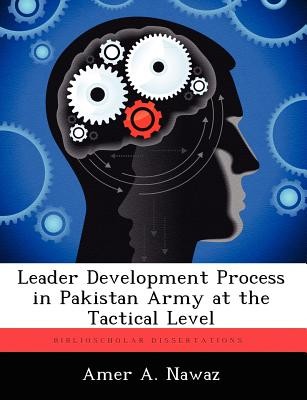
- We will send in 10–14 business days.
- Author: Amer A Nawaz
- Publisher: BiblioScholar
- Year: 2012
- Pages: 86
- ISBN-10: 1249371414
- ISBN-13: 9781249371410
- Format: 18.9 x 24.6 x 0.5 cm, softcover
- Language: English
- SAVE -10% with code: EXTRA
Leader Development Process in Pakistan Army at the Tactical Level (e-book) (used book) | bookbook.eu
Reviews
Description
This study focuses on the leader development process of Pakistan Army at the tactical level, i.e. up to a maximum of seven years of service. It analyzes the present leader development process of Pakistan Army to see its effectiveness to train leaders at the tactical level to perform effectively in future. The study uses the writings of a few Pakistani authors and Stephen P. Cohen, other than personal experience as the primary references to describe the influences on the present leader development model. It also uses a number of writers from Pakistani and US military to establish the requirements of future. The study identifies the focus for the leader development process of Pakistan Army for the leaders at the tactical level by comparing the attributes and skills cultivated by the society and military culture and the requirements of future. The established focus is then used as a measure of effectiveness to assess the present leader development model to ascertain its usefulness to train leaders for future. It concludes by providing a list of attributes and skills promoted and cultivated by the society and military culture and those that are required to meet the future environments. After concluding that the present leader development process does not train leaders at tactical level to perform effectively in future, it provides specific recommendations in all three components of the leader development process. In the end the study also identifies a few areas for further research.
EXTRA 10 % discount with code: EXTRA
The promotion ends in 16d.04:44:53
The discount code is valid when purchasing from 10 €. Discounts do not stack.
- Author: Amer A Nawaz
- Publisher: BiblioScholar
- Year: 2012
- Pages: 86
- ISBN-10: 1249371414
- ISBN-13: 9781249371410
- Format: 18.9 x 24.6 x 0.5 cm, softcover
- Language: English English
This study focuses on the leader development process of Pakistan Army at the tactical level, i.e. up to a maximum of seven years of service. It analyzes the present leader development process of Pakistan Army to see its effectiveness to train leaders at the tactical level to perform effectively in future. The study uses the writings of a few Pakistani authors and Stephen P. Cohen, other than personal experience as the primary references to describe the influences on the present leader development model. It also uses a number of writers from Pakistani and US military to establish the requirements of future. The study identifies the focus for the leader development process of Pakistan Army for the leaders at the tactical level by comparing the attributes and skills cultivated by the society and military culture and the requirements of future. The established focus is then used as a measure of effectiveness to assess the present leader development model to ascertain its usefulness to train leaders for future. It concludes by providing a list of attributes and skills promoted and cultivated by the society and military culture and those that are required to meet the future environments. After concluding that the present leader development process does not train leaders at tactical level to perform effectively in future, it provides specific recommendations in all three components of the leader development process. In the end the study also identifies a few areas for further research.


Reviews